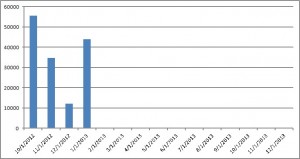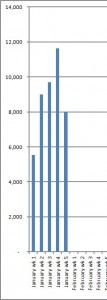 Jackson isn’t old enough yet to go outside by himself. So, he just watches Isabel from the window, envious of her Big Kitty privileges.
Jackson isn’t old enough yet to go outside by himself. So, he just watches Isabel from the window, envious of her Big Kitty privileges.
In the past I’ve used the analogy of being in training for producing wordcount.I continue to be amazed at just how well the principle applies. But if you’re sick of this topic, feel free to move on.
(Not that you aren’t always free to move on – I’m just warning you that this might be repeat. I’m like the old auntie who traps you at the family picnic and asks if I’ve ever told you about my trip to Japan. She won’t let you run. I will.)
One of the things I’ve learned about exercising is that it really pays to keep track of what you’re doing and use that record to increase your effort incrementally. I say this as a person who is NOT an athletic type. I hid in the bathroom during gym class. Was always picked last for ANY team. The high school coaches would kind of curl their lips up when they saw me in the hallways. I used to brag that I never broke into more than a fast walk, for any reason.
Now I run on the treadmill three days a week and lift weights the other three, alternating upper and lower body. This is because I, um, got fat. And I’m vain. Plus I have a lot of books I want to write and I’d prefer to live a long and healthy life.
So, you guys know I’m a methodical person – and that I love my spreadsheets. I studied what I should do and started tracking. Knowing how much weight you used to lift and how much you’re lifting now gives you a really good sense of perspective. Plus, when I don’t exercise for a while – due to a business trip or vacation or stuffing my face with Christmas cookies – then I can really see the impact of that. I have to build back up to where I was. It’s a very real and marked phenomenon.
And it happens with writing, too.
I’ve long been tracking my daily wordcount goals and progress. For the last few months, I’ve been tracking my weekly and monthly progress as well. I want to know my patterns and what I’m capable of.
Thus, I have not only spreadsheets, but graphs! 😀
 These are my monthly wordcounts for the last four months. October was a big push. I finished a couple of projects by Thanksgiving and then moved into doing a lot of editing. And stuffing my face with Christmas cookies.
These are my monthly wordcounts for the last four months. October was a big push. I finished a couple of projects by Thanksgiving and then moved into doing a lot of editing. And stuffing my face with Christmas cookies.
I’d planned to hit things hard again in January, but you can see that I did not match my October performance. In a stunning coincidence – I am just now getting back to my pre-Christmas body fat and endurance levels physically, too.
Go figure.
But I think this is even more interesting.
 This graph shows my weekly wordcount for January. The first and last weeks were both five day weeks (only counting January days), so they’d be likely lower regardless. Still – look at how I increased each week! This was immensely heartening for me to see, because I’d been focusing on not hitting my October levels and feeling like I wasn’t performing well. But each week, I did more. Even the last week of January, with the same number of days as the first week, shows a much better output.
This graph shows my weekly wordcount for January. The first and last weeks were both five day weeks (only counting January days), so they’d be likely lower regardless. Still – look at how I increased each week! This was immensely heartening for me to see, because I’d been focusing on not hitting my October levels and feeling like I wasn’t performing well. But each week, I did more. Even the last week of January, with the same number of days as the first week, shows a much better output.
The other thing these charts show me is that being in training really does matter. I can no more step into producing a high level of wordcount productivity after time off than I can jump back on the treadmill and expect to run as far or as fast as before all that cookie/face/stuffing.
Good to know, huh?
Now, go get your auntie a bottle of wine.
I gaze at your graphs in awe and wonder! SO not a spreadsheets and graphs person myself but as you say, a person has to do what works for them…and I do love your books!
you can take the girl out of science, but…
Yay, charts! I used to keep track of my daily word counts in Excel, but I never thought about doing charts. And then I drifted away from it. I really need to get back to keeping track and holding myself accountable – maybe then I’ll be able to increase my word count. =o)
let us know how it goes, B.E.!